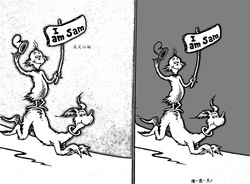 Warning: an attempt at humor follows! I have on my desk two different translations of the seminal text in the field of developmental psychology; “Viridia Ova atque Perna” by Dr. Suess. As befitting such a work, the first of the translations takes a straightforward approach to the task of translating Dr. Seuss' prose into modern Chinese. "I am Sam" becomes "我是山姆", "I do not like that Sam-I-am!" is translated word for word as "我不喜欢那个“山姆是我”!", etc. Sentences like "Would you? Could you? In a car?", where the exact activity in question is left unsaid, are translated explicitly as "那你愿不愿意,要不要在车里吃?", avoiding any possible misunderstanding. Additionally, Dr. Suess' usage of the terms ‘would, could, may, like’ etcetera are translated faithfully and consistently. The translator does, unfortunately, take liberties with certain phrases: “Say! In the dark”,for example, is translated as “嘿!摸黑吃呢?”, 摸黑 being a common and course phrase indicating the performance of some activity, probably in the countryside, in the dark. I would preferred a more literal translation; “在黑暗中吃”,for example. All in all it is quite a satisfactory source-based translation, and I do express my appreciation to the publisher for their quite appropriate choice of 16 point English text with 8 point Chinese text. This leads me to the second book. I am nearly at a loss of words when it comes to expressing my opinion about the decision to translate ‘Sam’ as the Chinese character 凡 (fan). There is a perfectly acceptable and established Chinese equivalent of the name, 山姆 (shanmu), and just because ‘fan’ rhymes with ‘Sam’, and it allows for aesthetically pleasing lines like 凡是俺/凡是俺/我不喜欢/凡是俺 is no excuse to do away with convention and strike out on one’s own! Let us look at the line “I would not, could not in a tree./Not in a car! You let me be.”The previous translator, of whom I am so fond, translated it word by word, line by line, adding in missing details not found in the source text: “我不愿意,也不要在树上吃。/不要在车上吃!你别缠着我啦!”. Perhaps not so pleasing in the mouth, or to the ear, but such accuracy! Such faithfulness to the text! It is only with great pain that I can bring myself to enter the version belonging to the latter translator: “我不想在大树上,/更不想要在车上,/拜托你别烦。”. Ok, it is quite nice how the first two lines have seven characters apiece, reminding one of the traditional Chinese 7-character poetry form. And the way each line ends with similar –ang/-ang/-an finals does reflect Dr. Seuss’ own usage of rhyme. But the source! The source! Oh does mine heart weep. The final straw, the one that broke this camel’s back: my six-year-old daughter, fluent in Chinese, prefers the latter version as well! ps: In case it was not obvious, I much prefer the second translation, by 郝广才 Hao Guangcai, and published by Yuan-Liou Publishing, Taipei
1 Comment
anna
6/6/2019 03:54:15 pm
How can I purchase a copy of the 2nd translation (俺是凡 by 郝广才) - definitely seems way better than the first!
Reply
Your comment will be posted after it is approved.
Leave a Reply. |
AuthorPractitioner, Translator, Teacher Archives
March 2021
Categories |
 RSS Feed
RSS Feed